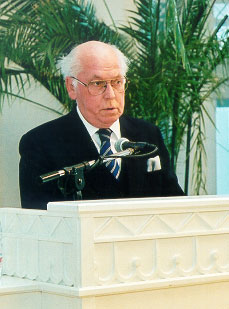the Learned Republic - and this is a quotation from the year 1815 -,
dear guests!

Holding this very beautiful medal in my hands, I would like to say a word of thanks to the authors who delivered interesting presentations here today. I would rather not deliberate the reasons that allow us to speak of moral crisis in Estonia. To Peeter Olesk, I would like to point out that the Estonian word ''klike''* was derived from the Russian ''клика'', which was introduced at the time of the Third International, and could be encountered here in Estonia from June 21, 1940, and unfortunately until the year 1991. Dear friends, these are the reasons why we, while indeed building the Republic of Estonia, are at the same time producing soviet-like power. And also the reasons for our inability to differentiate between the two - let us keep in mind that during the Soviet russification, the Estonian linguists protected our language, so why are they not doing the same today, or why didn't they do it one or two years ago? - the reasons are that the greatness of the change has touched our souls but not yet our reason.
The crucial issue is that the foreign policy analysis issued by the Ministry of Foreign Affairs of the Republic of Estonia says that there are no external factors jeopardising the independence of the Republic of Estonia at this time. We have reasons to sign this gladly. I mean ''gladly'', because this will then direct our eyes to the next factor, which is indeed a jeopardy: the lack of education. It is manifest not in the unavailability of education, but in the inflation of educational life: we live in an environment that has been created artificially in Estonia, it is an artificial environment and not natural for a region where hard work has been necessary to keep body and soul together. In these conditions, the temptation to be uneducated is our dangerous enemy. Especially if the uneducated are better paid than the educated.
I would like to thank Margus Laidre for his beautiful and charming speech, and for the quotation from one of my books, saying that we were here already at the time when they started making thatched roofs in Sweden. Still, I would like to disagree with the question ''Where, then, are the pyramids of Estonia?'' We will have time to peruse this question within the next ten years. I have begun to see history, linguistics, genetics, and the migration of peoples from the south towards the north as a major integral whole. We must understand the reasons why human life became possible at this very place as the glaciers retreated, and we must also be able to assess the ancient authors who did not always presume that life was possible here, or who considered for instance the Nenets to be cannibals. We have surprisingly seldom been able to connect history to human energy needs. Let us understand that those needs have an impact on the present as well as on the future, and that in the broader vicinity of the Baltic Sea, Estonia is the only energetically independent region besides Norway - why, then, have we done nothing to build up the connection with the Nordic energy circle?
Let us come back to history. What an accomplishment it was to build up a culture, and a very energetic culture. But to ask whether this culture is justified, or whether it is perhaps just a culture of peasants'? The additional work that has to be done to preserve life as the latitude increases - this is our main difference from the tropical and subtropical regions, the native home of humankind. The culture created by this additional work has given us this wonderful situation where we have - besides the oil shale - also a greater share of such treasures as pure air, pure water, and pure nature than any other developed region.